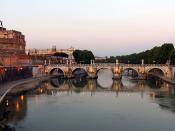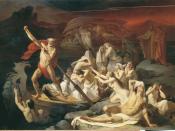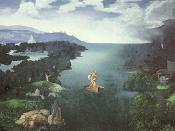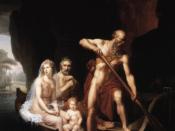Death In Rome when you died it was very important that you were buried properly and the correct procedure was followed. If something didn't go right the funeral would start again. The Romans believed in life after death, and the souls of the dead could help the living or make life hard for them. To insure that the souls of the dead rested in peace a gold coin would be placed under the tongue, this was to pay the ferryman Charon to cross the river Styx. If you didn't have a coin or you drowned you had to wait for 100 years. Once across the river your soul would be judged. If you had a good life you would be sent to Elysia or the Elysian Fields. If you didn't you would be sent to Tartaurs where you would be tortured for all eternity. The bodies of the dead were cremated.
The cremations were held outside the city. The body would then be placed into the ground. The rich were put into sarcophagi. Some people would have an epitaph on there tomb. This was a brief description of the person how they lived and died. On the birthdays of the dead the family would have a meal in there honor. Most tombstones had a chute where food could be dropped into, this was thought to nourish the soul. Some Mausoleums had kitchen facilities and eating areas for these occasions. Most Romans belonged to a funeral club. These were clubs that a Roman would join and pay into over there life to pay for there funeral. The only class that had trouble paying into it were the unskilled plebs, they were usually thrown into a pit just outside the city walls.
Work Most Romans worked. Most of the rich had slaves to do all the work. They thought that work was below them.
The rich would be educated and go into the military as a tribune. When they came out of the military they went into politics. They were put into a arranged Marriage planned by the head of the family. The middle class were educated to a lesser level and went into the military.
They then went into the family business. The marriage was arranger by the head of the family. The skilled plebs were educated to a lesser level still. They then went into an apprenticeship in a trade or a shop. The unskilled plebs had no education. They Built up a pool of temporary work like laboring or hiring them self out to people without slaves. The unskilled plebs could collect 2 forms of dole. The first was the grain dole where each man was given an amount of grain to last a mounth. The grain was also available to children but boys recived more than girls. The second form of dole was patronage.
Each Roman was a client and a patron. The client would see if there were any jobs that needed to be done and vote the way the patron wanted them to, and be a part of a big crowd accompining the patron in public. In return the patron would help out with money, give legal advise to them, invite client to dinner or give food. Many Romans had many patrons or clients.The working day started at sunrise when they would have breakfast and work approximatly eight hours. Mid afternoon they would stop and have lunch. In the afternoon they would go to the baths. After that they would go home and have dinner in the evening.
Housing Most people in Rome lived in a Inslua. This was a small apartment building. They had no running water or sewerage. The bottom floors had fewer ocupants than the higher floors. There were no cooking facilities so a brazier was brought around the rooms to do the cooking.
The middle class usually occupied the bottom floor.The rich would live in a Domous which was a bigger house.
They were usually one storey. There were about one domous for every twenty six insular. Very few people could afford these. There was no running water but there were cooking facilities. There was no noise control in the insular so the were very noisy places. Bothe houses were at risk from two things that could destroy houses. These were fire and collapse. If fire was left to burn the whole city was at risk as all the buildings were so close together.
![[Piazza Navona, Rome, Italy] (LOC)](https://s.writework.com/uploads/5/50515/piazza-navona-rome-italy-loc-thumb.jpg)




